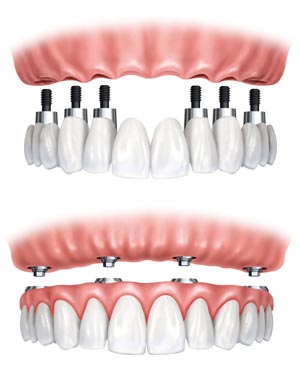Almost anyone who is missing one or more teeth can be a dental implant candidate, but before deciding if the implants are right for you, there are several factors to consider. Here are the most commonly asked questions surrounding the dental implants procedure.
What are Dental Implants?
A dental implant is a great alternative to replace one or more missing or broken teeth. A small titanium screw is surgically implanted and fused with the jawbone. A post or abutment is then attached and a crown or prosthesis is placed over the implant as a natural looking and functional tooth. The entire procedure is done in several stages and can take anywhere from three to nine months.
Dental Implants Benefits
By far, the best benefit from implants is solid support for new teeth. Dental implants are stronger and more durable than their counterparts, and they provide a cavity-resistant alternative to other options such as crowns and bridges. The implants serve as the root for missing teeth and they are surgically planted in the jawbone. The titanium fuses with the jawbone, ensuring that the implants will not slip or cause bone damage, unlike dentures or bridgework.
How Long Is the Process?
Dental implant surgery is not a quick procedure. Because it is done in several stages, the entire process can take anywhere from three to nine months. In some cases, the entire dental implant procedure from start to finish takes well over a year, but a large portion of the time is dedicated to healing. There is a waiting period between each procedure to allow for proper healing and new bone growth at the implant site.
What are the Risks?
As with any other surgery, dental implant surgery can pose a few health risks. Luckily, the problems are rare, usually very minor and easily treated. Because this is not a minimally invasive surgery, there is a chance of contracting an infection at the implant site; poor oral hygiene increases the risk of infection. Dental implants can also fail if they are placed in poor positions. The implants can also break or the crown can come loose. If this occurs, the procedure may need to be repeated.
Is There Pain After the Procedure?
It is not uncommon to experience some discomfort after the surgery. Minor bleeding, swelling of the gums and face, bruising of the gums, and slight to moderate pain at the implant site are normal. Pain medication and antibiotics are usually prescribed to patients after the surgery. If the discomfort, pain, swelling or bleeding persists after a few days or gets worse, patients should contact the dental surgeon immediately. Other risks include injury to the surrounding area or nerve damage. Sinus problems can occur if an implant is placed into one of the sinus cavities in the upper jaw.
How to Care for Implants
Poor hygiene can cause the buildup of bacteria, and these bacteria could eventually weaken the gums. This may cause the implants to loosen and potentially fall out. Dental implants need to be brushed, flossed and cared for as if they are natural teeth. Specially designed toothbrushes are available to effectively remove plaque from hard to reach places, and these interproximal toothbrushes are ideal for dental implant cleaning because they come in various sizes. Floss threaders, such as Dentek, reach between the implants to remove any food particles left over after brushing. As with natural teeth, patients should be sure to visit a dentist regularly.
Before deciding if dental implants are right for you, it is important to understand the procedure, recovery time, after care and possible risks associated with the surgery.


